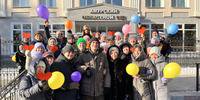The Case of Balabkin in Belogorsk
Filter
- #
Investigator of the Investigation Department of the FSB of Russia in the Amur Region, Senior Lieutenant of Justice V. S. Obukhov initiates a criminal case against 68-year-old Vladimir Balabkin. The believer is accused of organizing the activities of an extremist organization (Part 1 of Article 282.2 of the Criminal Code of the Russian Federation). This is how the investigation interprets the peaceful worship services of Jehovah's Witnesses.
- #
The judge of the Blagoveshchensk City Court of the Amur Region orders searches in the homes of residents of Belogorsk.
- #
Searches are being conducted in Vladimir's house and at five other addresses of believers. Electronic devices and data carriers are seized from the Balabkin spouses. They are taken to the local department of the FSB to issue copies of the protocols.
- #
At the call of the investigator, Vladimir and his wife come to the FSB of Blagoveshchensk, although due to the exacerbation of a chronic disease, it is difficult for him to cover a long distance (140 km). The believer is photographed and fingerprinted. Obukhov gives him a copy of the decision to initiate a criminal case, which states that Balabkin and "unidentified persons from among Jehovah's Witnesses ... committed deliberate actions of an organizational nature ... Namely, they organized a meeting of followers of religious organizations." In this regard, Vladimir emphasizes: "I am an individual, not a legal entity." To which the investigator asks him not to object.
- #
Vladimir Balabkin is being interrogated as a suspect. He is charged with committing a crime under Part 1 of Article 282.2 of the Criminal Code of the Russian Federation. A measure of restraint is chosen for the believer in the form of an obligation to appear.
- #
Investigator R. I. Volkov issues a decision to bring Vladimir Balabkin as a defendant under Part 1 of Article 282.2 of the Criminal Code of the Russian Federation. The accused is being interrogated. Medical documents confirming the serious state of health of the believer are attached to the case.
The defense filed a motion to terminate the criminal case due to the absence of a crime, but the investigator refuses.
- #
The investigator shall report on the completion of the investigative actions. Soon the case will be transferred to the Belogorsk City Court of the Amur Region.
- #
The case goes to the Belogorsk City Court of the Amur Region.
- #
The hearings in the case of Vladimir Balabkin begin. 30 people come to the courthouse to support the believer. At first, no one is allowed into the courtroom, citing the fact that Balabkin is being tried under an extremist article. After the defense draws the court's attention to the fact that the hearing is open, 12 people are allowed into the courtroom, including Vladimir's son and daughter-in-law, who are witnesses in the case.
- #
FSB operative Dmitry Shcherbakov is being interrogated.
Answering questions from the defense, he reports that Vladimir Balabkin invited his fellow believers for liturgical meetings. When asked whether the operative revealed signs of extremist activity in Balabkin's actions, the witness replies that he himself does not determine whether there is corpus delicti in the actions of believers. He points out that he considers Vladimir guilty because he "provided devices for connecting to meetings of Jehovah's Witnesses", "connected others to meetings" and "showed how to use programs."
- #
Witness Khodukin is being interrogated. He collaborated with the FSB and conducted covert video filming of worship services of believers.
Khodukin tells the court that he met Jehovah's Witnesses in 2019 through an acquaintance. According to him, he was looking for answers to the questions that tormented him, so he began to study the Bible.
The lawyer asks the witness if he saw anything forbidden from the point of view of the law at meetings of believers. The witness expresses the opinion that "meetings of the congregation were already prohibited from the point of view of the law." The lawyer notes that the legislation of the Russian Federation does not prohibit peaceful worship of any religion.
- #
The conclusion of an expert linguist is investigated. Vladimir Balabkin asks the court to summon a specialist for questioning. Prosecutor Anton Raschupkin objects and draws attention to the fact that the expert's opinion clearly states: no signs of extremism were found.
The judge proceeds to interrogate Balabkin. He gives arguments in his defense, relying on regulations and case materials that were not examined in court.
- #
The prosecutor in the debate asks the court to send Vladimir Balabkin to a colony for 6.5 years. The believer, speaking with the last word, says: "I have not done anything wrong for which I should be punished." After that, the court immediately proceeds to the announcement of the verdict.
The last word of the defendant Vladimir Balabkin in Belogorsk - #
Vladimir Balabkin is placed in pre-trial detention center No. 1 in the Amur Region. He can write letters.
- #

